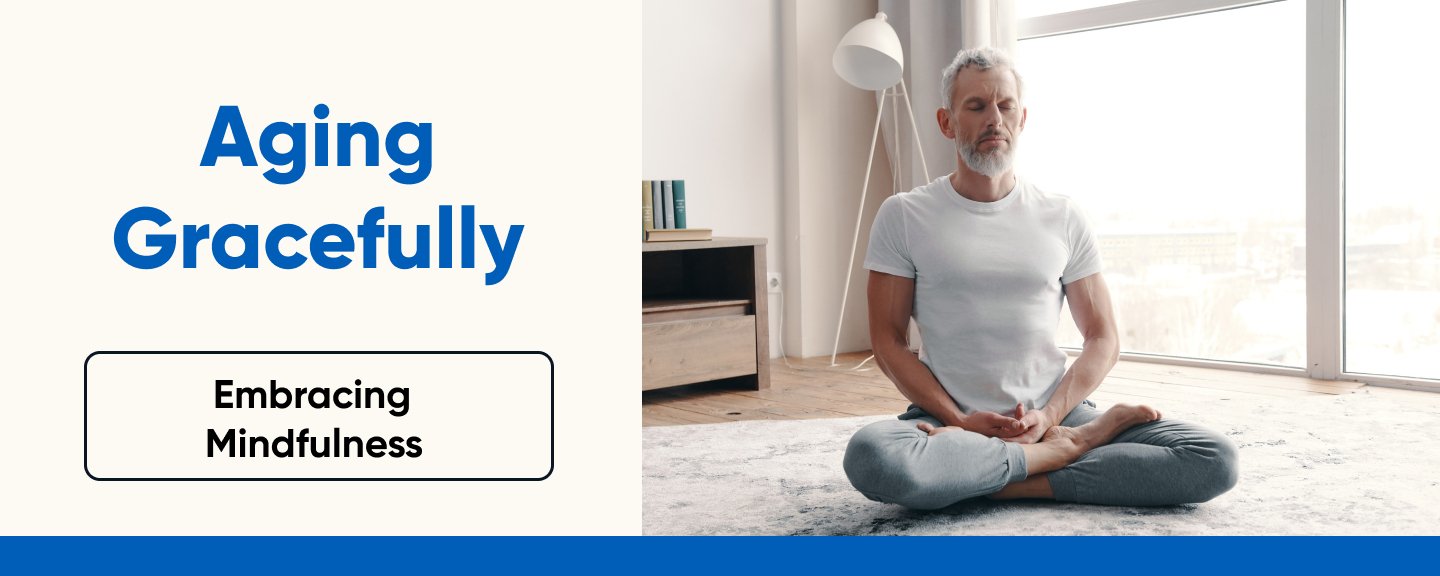Aging Gracefully: Embracing Mindfulness

As we journey through life, the aging process inevitably brings changes, challenges, and opportunities for growth. While aging is a natural and inevitable part of the human experience, it's how we approach this journey that can make all the difference in our well-being and quality of life. In recent years, mindfulness has emerged as a powerful tool for promoting emotional resilience, cultivating a sense of purpose, and enhancing overall well-being, particularly in later life. In this blog post, we'll explore the benefits of mindfulness for aging gracefully and offer practical tips for incorporating mindfulness practices into your daily life.
The Wisdom of Aging:
Before delving into mindfulness, it's important to recognize the unique gifts and wisdom that come with aging. As we accumulate life experience, we gain a deeper understanding of ourselves, our relationships, and what truly matters in life. With age often comes a greater sense of perspective, gratitude, and acceptance of life's imperfections. Embracing these qualities can lay the foundation for a more mindful and fulfilling journey through the later stages of life.
The Role of Mindfulness:

Mindfulness, rooted in ancient contemplative traditions such as Buddhism, offers a profound way of relating to the present moment with openness, curiosity, and non-judgment. By cultivating mindfulness, individuals can develop greater self-awareness, emotional resilience, and a sense of connection to themselves and the world around them. In the context of aging, mindfulness can be particularly beneficial for:
- Emotional Well-Being: As we age, we may face various challenges such as health issues, loss of loved ones, or changes in roles and identity. Mindfulness can provide a supportive framework for navigating these challenges by allowing us to approach them with greater equanimity, compassion, and acceptance. By cultivating mindfulness, we can learn to respond to difficult emotions with kindness and self-care, rather than being overwhelmed by them.
-
Cognitive Health: Research suggests that mindfulness practices may help maintain cognitive function and protect against age-related cognitive decline. By promoting attentional control, working memory, and cognitive flexibility, mindfulness exercises can support cognitive resilience and enhance overall brain health as we age.
-
Physical Well-Being: Mindfulness practices such as mindful movement, gentle yoga, and body scan meditation can help promote physical well-being by reducing stress, enhancing relaxation, and improving body awareness. By tuning into bodily sensations and listening to the body's needs, individuals can cultivate a greater sense of vitality and self-care as they age.
- Finding Meaning and Purpose: In later life, many individuals may grapple with questions of meaning, purpose, and legacy. Mindfulness can offer a pathway for exploring these existential concerns by encouraging introspection, gratitude, and a deeper connection to one's values and aspirations. By living with greater intention and presence, individuals can find fulfillment and purpose in each moment, regardless of age or circumstance.
Practical Tips for Incorporating Mindfulness:

- Start Small: Begin with short mindfulness practices, such as mindful breathing or body scan meditation, and gradually increase the duration and complexity as you become more comfortable. Remember, mindfulness is not about achieving a particular state of mind but rather about cultivating a present-moment awareness with openness and acceptance.
- Integrate Mindfulness into Daily Activities: Look for opportunities to practice mindfulness in everyday activities such as walking, eating, or gardening. Approach these activities with full attention and curiosity, noticing the sensations, thoughts, and emotions that arise without judgment.
- Join a Community: Consider joining a mindfulness group or class tailored for older adults. Connecting with others who share your interest in mindfulness can provide support, encouragement, and opportunities for shared learning and growth.
- Be Kind to Yourself: As you embark on your mindfulness journey, remember to be patient and compassionate with yourself. Embrace the ups and downs of the practice with a spirit of curiosity and self-compassion, knowing that each moment is an opportunity for learning and growth.
Embracing the Journey:
In conclusion, aging gracefully is not about defying the passage of time or clinging to youth, but rather about embracing the journey with wisdom, grace, and mindfulness. By cultivating present-moment awareness, emotional resilience, and a sense of purpose, individuals can navigate the later stages of life with greater ease, equanimity, and fulfillment. Remember, the beauty of mindfulness lies not in reaching a destination, but in savoring the richness of each moment along the way.
Featured Products












